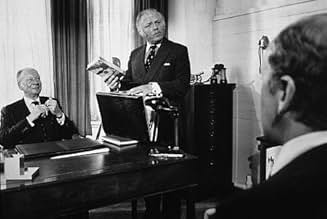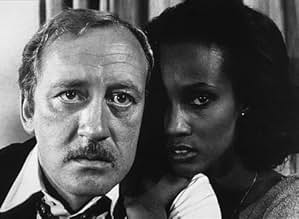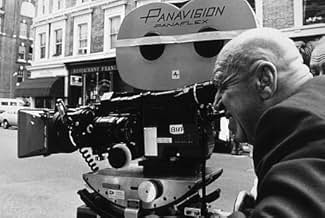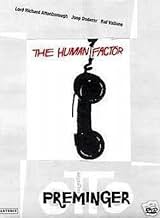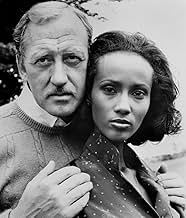ÉVALUATION IMDb
6,1/10
1,7 k
MA NOTE
Lorsque l'on découvre que des informations ont fuité dans le service de renseignements britanniques aux affaires africaines, Daintry, agent de la sécurité, est amené à enquêter.Lorsque l'on découvre que des informations ont fuité dans le service de renseignements britanniques aux affaires africaines, Daintry, agent de la sécurité, est amené à enquêter.Lorsque l'on découvre que des informations ont fuité dans le service de renseignements britanniques aux affaires africaines, Daintry, agent de la sécurité, est amené à enquêter.
- Director
- Writers
- Stars
Avis en vedette
'Sr Moreno' dismisses the Preminger film adaptation of 'The human factor' very intemperately: The clincher of his argument - which consists largely in being rude to Iman (she was perfectly adequate in her role, and certainly believably a beauty whom a career diplomat might have risked his career for) - is Graham Greene's own declared dislike of Preminger's version.
While obviously his own direct collaboration with Carol Reed made 'The Third Man' into the definitive Greene adaptation for the screen, and a classic sans pareil, there is still no need to be unduly respectful of his impatience with this version of his 'The human factor.'
After all, Greene had a well-known falling-out with Mankiewicz during the filming of the 1959 version of 'The quiet American,' but no-one else thinks that was a bad movie!
Few filmed adaptations are entirely successful - probably without the original author's close collaboration they will inevitably be more-or-less diminished versions of the literary form. And while Grahame Greene was perfectly entitled, with the status of 'onelie true begetter' to be hyper-critical of any lesser recensions, that is not a sensible reason for the rest of us not to enjoy and appreciate what is a perfectly intelligent and involving film in its own right.
There are few enough thrillers around on the TV today which do not involve various forms of adolescent excitability and excess that I should have thought the BBC were perfectly justified in giving it an airing recently on their 'thoughtful' channel.
This is no 'The third man' to be sure - but then, what is? This remains a film with, clearly, much in it to admire.
Surely, if every film has to achieve the status of 'masterpiece' before it can be accepted at all - as 'Moreno' appears to believe - then would there not be a certain danger of an unbridgeable culture-gap developing between the extremes of 'art-house film' and 'teen-flick'? Fortunately, audiences - and film-makers - are still quite willing to 'give it a go,' even if the results are 'merely' intelligent, rather than the absolutely brilliant - and still quite rare - product of genius!
Really, I feel most strongly that 'Moreno''s strictures represent exactly the kind of intellectual snobbery which can only tend to alienate cinema audiences even further from any more sober and challenging films.
There really are enough points of worthwhile discussion raised by this film of 'The human factor' for it to be impossible to dismiss in a single paragraph of supercilious contempt: 'Terrible' does not amount to a review, but only to intemperate spleen, I'm afraid.
While obviously his own direct collaboration with Carol Reed made 'The Third Man' into the definitive Greene adaptation for the screen, and a classic sans pareil, there is still no need to be unduly respectful of his impatience with this version of his 'The human factor.'
After all, Greene had a well-known falling-out with Mankiewicz during the filming of the 1959 version of 'The quiet American,' but no-one else thinks that was a bad movie!
Few filmed adaptations are entirely successful - probably without the original author's close collaboration they will inevitably be more-or-less diminished versions of the literary form. And while Grahame Greene was perfectly entitled, with the status of 'onelie true begetter' to be hyper-critical of any lesser recensions, that is not a sensible reason for the rest of us not to enjoy and appreciate what is a perfectly intelligent and involving film in its own right.
There are few enough thrillers around on the TV today which do not involve various forms of adolescent excitability and excess that I should have thought the BBC were perfectly justified in giving it an airing recently on their 'thoughtful' channel.
This is no 'The third man' to be sure - but then, what is? This remains a film with, clearly, much in it to admire.
Surely, if every film has to achieve the status of 'masterpiece' before it can be accepted at all - as 'Moreno' appears to believe - then would there not be a certain danger of an unbridgeable culture-gap developing between the extremes of 'art-house film' and 'teen-flick'? Fortunately, audiences - and film-makers - are still quite willing to 'give it a go,' even if the results are 'merely' intelligent, rather than the absolutely brilliant - and still quite rare - product of genius!
Really, I feel most strongly that 'Moreno''s strictures represent exactly the kind of intellectual snobbery which can only tend to alienate cinema audiences even further from any more sober and challenging films.
There really are enough points of worthwhile discussion raised by this film of 'The human factor' for it to be impossible to dismiss in a single paragraph of supercilious contempt: 'Terrible' does not amount to a review, but only to intemperate spleen, I'm afraid.
After I had read this late Graham Greene novel years ago, I was immediately fascinated by its le Carré-like plot with very much Greene-like characters. I immediately thought that this should have been made into a movie.
Shortly afterwards, I learnt that Preminger had already made it into a film back in 1979, so I was of course very eager to see this movie. Yet - this film has fallen into oblivion, it is not commercially available and it is hardly ever on TV.
Very strange if you consider that it features a cast bristling with splendid British character actors (Nicol Williamson, Derek Jacobi, Robert Morley, Richard Attenborough, to name but a few) and has a screenplay by Tom Stoppard (which IMHO was a straightforward, enjoyable transfer of Greene's novel to the screen).
So, only yesterday did I have the opportunity to watch it on TV. Certainly, it is no cinematographic highlight: it is very low-key, very unfussily directed by Otto Preminger in a more than plain style, and has basically no "action" (but then - what would you expect of a Greene novel?). It might as well have been made for TV, but this impression may also be due to the serious budget problems while filming.
However, it has some splendid performances by actors whom I could watch all day long. The mere cast turns this film into a success and makes it worthwhile watching.
Shortly afterwards, I learnt that Preminger had already made it into a film back in 1979, so I was of course very eager to see this movie. Yet - this film has fallen into oblivion, it is not commercially available and it is hardly ever on TV.
Very strange if you consider that it features a cast bristling with splendid British character actors (Nicol Williamson, Derek Jacobi, Robert Morley, Richard Attenborough, to name but a few) and has a screenplay by Tom Stoppard (which IMHO was a straightforward, enjoyable transfer of Greene's novel to the screen).
So, only yesterday did I have the opportunity to watch it on TV. Certainly, it is no cinematographic highlight: it is very low-key, very unfussily directed by Otto Preminger in a more than plain style, and has basically no "action" (but then - what would you expect of a Greene novel?). It might as well have been made for TV, but this impression may also be due to the serious budget problems while filming.
However, it has some splendid performances by actors whom I could watch all day long. The mere cast turns this film into a success and makes it worthwhile watching.
I must confess that this was the first Otto Preminger movie I've seen, so I cannot comment it as an Otto Preminger movie, but rather just a movie among others.
I'm very much a fan of both cold war spy movies and 70/80s Great Britain, so the elements were in place for me to enjoy this. I had never heard of this (I'm yet to go through Preminger's movies) and I quite randomly picked it from the online service as it seemed pretty interesting.
And it was interesting. Very subtle and talkative, I have to say I really really liked it. The story itself wasn't too exciting, but interesting nonetheless. It's about the secret service and an apparent leak of information - possibility of double agents and so on. Very gripping, yet quite slow paced - no action. I just watched le Carre film "The Spy Who Came in from the Cold" and they are quite alike in style, altho I have to say I enjoyed this more. Even if it's not necessarily as well made, this wasn't quite as heavy-handed.
The acting is great for the most part. Nicol Williamson was a name I hadn't heard of before, but his presence really made this movie. Very understated and brilliant character, just like anyones neighbor or work colleague. There's a weak link too unfortunately and that's Iman, she's horribly wooden and unnatural in her acting most of the time.
I'm dropping one point because of sloppy cinematography too - lighting in particular and a few shots that look really staged. I'm not sure why some scenes were so horribly set up, the lights almost looked as if they just flipped a few spotlights over and pointed them at actors faces.
Despite these few flaws, it's a really enjoyable spy movie for anyone into cold war spy stories in style of le Carre etc. Grab a whisky and time machine yourself back into cold war era. This doesn't seem to be too well distributed tho so it may be a bit hard to find.
I'm very much a fan of both cold war spy movies and 70/80s Great Britain, so the elements were in place for me to enjoy this. I had never heard of this (I'm yet to go through Preminger's movies) and I quite randomly picked it from the online service as it seemed pretty interesting.
And it was interesting. Very subtle and talkative, I have to say I really really liked it. The story itself wasn't too exciting, but interesting nonetheless. It's about the secret service and an apparent leak of information - possibility of double agents and so on. Very gripping, yet quite slow paced - no action. I just watched le Carre film "The Spy Who Came in from the Cold" and they are quite alike in style, altho I have to say I enjoyed this more. Even if it's not necessarily as well made, this wasn't quite as heavy-handed.
The acting is great for the most part. Nicol Williamson was a name I hadn't heard of before, but his presence really made this movie. Very understated and brilliant character, just like anyones neighbor or work colleague. There's a weak link too unfortunately and that's Iman, she's horribly wooden and unnatural in her acting most of the time.
I'm dropping one point because of sloppy cinematography too - lighting in particular and a few shots that look really staged. I'm not sure why some scenes were so horribly set up, the lights almost looked as if they just flipped a few spotlights over and pointed them at actors faces.
Despite these few flaws, it's a really enjoyable spy movie for anyone into cold war spy stories in style of le Carre etc. Grab a whisky and time machine yourself back into cold war era. This doesn't seem to be too well distributed tho so it may be a bit hard to find.
This is an odd film. 'Low-key' is certainly an apt description, and though I don't agree, I can see why some have dismissed it as flat, tedious, etc.
It has stayed in my mind after each viewing - I've seen it twice now on television - more than many other more critically praised films. There's something about the deliberate underplaying, the bland, familiar suburbia of the leading character's house, the politeness, the dog.... The film shows us a non-dramatic world in which dramatic events are being played out in secret, under cover of banal normality. It recalls the hurried departures of Kim Philby and friends from their own domestic lives. It's unsettling: what else might be happening in our own quiet streets?
Personally, I think it's rather wonderful. Clearly it's an ancestor of the brilliant TV adaptations of Le Carre; indeed, it feels more like Le Carre than Greene, which may be why Greene reportedly didn't like it. But it needs to be viewed for what it is: an essay in tension, told in a deliberately chosen style. If you only like action films, it's not for you.
It has stayed in my mind after each viewing - I've seen it twice now on television - more than many other more critically praised films. There's something about the deliberate underplaying, the bland, familiar suburbia of the leading character's house, the politeness, the dog.... The film shows us a non-dramatic world in which dramatic events are being played out in secret, under cover of banal normality. It recalls the hurried departures of Kim Philby and friends from their own domestic lives. It's unsettling: what else might be happening in our own quiet streets?
Personally, I think it's rather wonderful. Clearly it's an ancestor of the brilliant TV adaptations of Le Carre; indeed, it feels more like Le Carre than Greene, which may be why Greene reportedly didn't like it. But it needs to be viewed for what it is: an essay in tension, told in a deliberately chosen style. If you only like action films, it's not for you.
Not being familiar with the source material upon which this is based, I worried that i would have a hard time following the various plot entanglements upon learning it was based on a rather knotty British spy novel but the screenplay makes everything that is happening (and why) more or less clear enough for someone just catching it randomly (like i did) to get.
Film's first half is really quite good. It takes you into the cold and somewhat distant world of this quite average bureaucrat's office and then home life (wherein you learn that he's being suspected of leaking top secret info--"very unimportant top secret info" as one of the characters making these allegations says--but top secret none the less.) Film really captures and sustains a very solid tone of slow growing mistrust by everyone in the film. Nicol Williamson's character realizes he's under suspicion right away but the various other characters' slow burning distrust of one another grows rather nicely as the film goes on. (In true British spy film tradition tho none of them ever seem to voice their distrust of one another to each other, choosing instead calmly and carefully constructed parables of being trapped in boxes within boxes.) As Nicol Williamson somewhat slowly tries to put together a plan to quiet his superior's suspicions about him and keep his wife and adopted son safe, everything around him naturally falls apart and the film's narrative somewhat suffers from having to keep clear the reasons why Williamson is doing what he's doing as well as what his superior's are up to (and why they too are doing what they're doing) It doesn't help that the film without much warning about halfway through flashes back to Williamson's time in Africa when he first met and began an affair with the woman who would come to be his wife---that part is of course supposed to explain Williamson's motivation and give you some idea of what's at stake--but because of its rather abrupt happening, you never really feel much except for confusion, especially once the film just as arbitrarily jumps back to present day.
Film's last half hour or so gets somewhat jumbled and almost completely loses the nice quiet momentum it had been steadily building up---jumbled as in i'm not entirely sure what exactly happened but I get the main idea regardless. I won't spoil the events that happen but I will say that the big event that happens at film's end certainly doesn't feel like a big event, nor does it feel like a very satisfactory ending. Perhaps the novel was able to end this way because it was able to leave you with the proper sense that the main character's feelings on what is happening to him was resolved more or less, but the film literally leaves you hanging for much, much more closure on behalf of the fate of one Maurice Castle.
That said there are some wonderful details featured throughout. From Robert Morley's delicious performance as the devious doctor whom the section employs for "physicals" of its employees, to the wedding reception at the easily cowed secion chief Richard Attenborough's house (wherein his shrew of an ex wife completely chastises him for breaking her precious ceramic owls) to the painting of boxes decorating the hotel walls where the villains meet in the first half to discuss what is to be done with their suspects to just about every scene featuring Derek Jacobi as the heavy drinking/no sweat colleague of Castle, there is much to be savored and enjoyed here...just don't expect any action or actual resolutions to the film's various plot points.
Film's first half is really quite good. It takes you into the cold and somewhat distant world of this quite average bureaucrat's office and then home life (wherein you learn that he's being suspected of leaking top secret info--"very unimportant top secret info" as one of the characters making these allegations says--but top secret none the less.) Film really captures and sustains a very solid tone of slow growing mistrust by everyone in the film. Nicol Williamson's character realizes he's under suspicion right away but the various other characters' slow burning distrust of one another grows rather nicely as the film goes on. (In true British spy film tradition tho none of them ever seem to voice their distrust of one another to each other, choosing instead calmly and carefully constructed parables of being trapped in boxes within boxes.) As Nicol Williamson somewhat slowly tries to put together a plan to quiet his superior's suspicions about him and keep his wife and adopted son safe, everything around him naturally falls apart and the film's narrative somewhat suffers from having to keep clear the reasons why Williamson is doing what he's doing as well as what his superior's are up to (and why they too are doing what they're doing) It doesn't help that the film without much warning about halfway through flashes back to Williamson's time in Africa when he first met and began an affair with the woman who would come to be his wife---that part is of course supposed to explain Williamson's motivation and give you some idea of what's at stake--but because of its rather abrupt happening, you never really feel much except for confusion, especially once the film just as arbitrarily jumps back to present day.
Film's last half hour or so gets somewhat jumbled and almost completely loses the nice quiet momentum it had been steadily building up---jumbled as in i'm not entirely sure what exactly happened but I get the main idea regardless. I won't spoil the events that happen but I will say that the big event that happens at film's end certainly doesn't feel like a big event, nor does it feel like a very satisfactory ending. Perhaps the novel was able to end this way because it was able to leave you with the proper sense that the main character's feelings on what is happening to him was resolved more or less, but the film literally leaves you hanging for much, much more closure on behalf of the fate of one Maurice Castle.
That said there are some wonderful details featured throughout. From Robert Morley's delicious performance as the devious doctor whom the section employs for "physicals" of its employees, to the wedding reception at the easily cowed secion chief Richard Attenborough's house (wherein his shrew of an ex wife completely chastises him for breaking her precious ceramic owls) to the painting of boxes decorating the hotel walls where the villains meet in the first half to discuss what is to be done with their suspects to just about every scene featuring Derek Jacobi as the heavy drinking/no sweat colleague of Castle, there is much to be savored and enjoyed here...just don't expect any action or actual resolutions to the film's various plot points.
Le saviez-vous
- AnecdotesAuthor Graham Greene said of his novel "The Human Factor" in his 1980 autobiography "Ways of Escape" that it was "to write a novel of espionage free from the conventional violence, which has not, in spite of James Bond, been a feature of the British Secret Service. I wanted to present the Service unromantically as a way of life, men going daily to their offices to earn their pensions."
- GaffesIn the South African scenes (filmed in Kenya), the cars have Kenyan registration plates.
- Citations
Maurice Castle: [referring to Davis] He calls all children "little bastards".
Meilleurs choix
Connectez-vous pour évaluer et surveiller les recommandations personnalisées
- How long is The Human Factor?Propulsé par Alexa
Détails
- Date de sortie
- Pays d’origine
- Sites officiels
- Langue
- Aussi connu sous le nom de
- Der menschliche Faktor
- Lieux de tournage
- sociétés de production
- Consultez plus de crédits d'entreprise sur IMDbPro
Box-office
- Budget
- 5 500 000 $ US (estimation)
- Brut – États-Unis et Canada
- 376 050 $ US
- Brut – à l'échelle mondiale
- 376 050 $ US
Contribuer à cette page
Suggérer une modification ou ajouter du contenu manquant

Lacune principale
By what name was The Human Factor (1979) officially released in India in English?
Répondre

